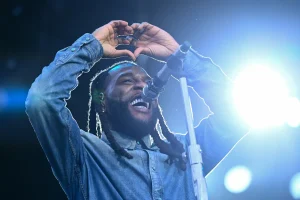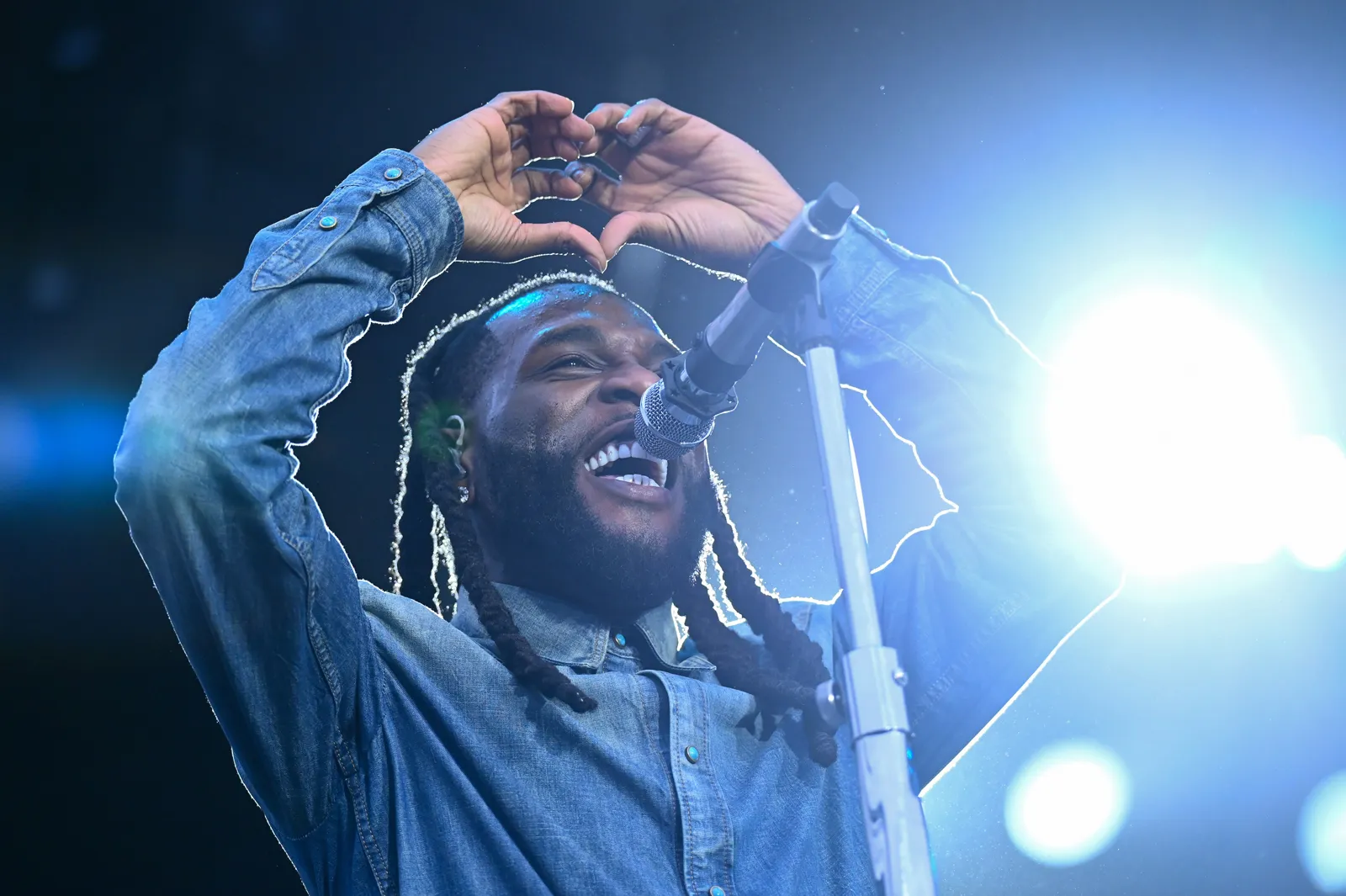Burna Boy Biography

Burna Boy (born July 2, 1991, Port Harcourt, Nigeria) is a Nigerian singer, songwriter, and musician and one of the most successful African Music artists. Ogulu helped popularize Afrobeats worldwide through his music releases and promotion, live performances, and collaborations with artists of diverse nationalities. Much of Ogulu’s music and the brand he built around it centers on the power of African culture and Black expression, and he advocates for Pan-Africanism.
Fela Kuti, the famed Afrobeat musician and singer, was Damini Ogulu’s childhood idol. In fact, Ogulu’s grandfather was Kuti’s first manager, and Ogulu’s mother, Bose Ogulu, works as his own manager.
Ogulu styles his music as “Afro-fusion,” although he is often dubbed an Afrobeats artist, after the electronic music that represents many rhythms of Africa and beyond ranging from rap and rhythm and blues (R&B) to jazz and dance. This term is conflated with Afrobeat, the protest funk music made famous by Fela Kuti in the 1960s and ’70s. Many of Ogulu’s songs feature lyrics in English, Yoruba, or a pidgin of the two.
“There’s no definition to it. This is music. This is divine colors that don’t have names,” Ogulu said, describing Afro-fusion in a 2024 interview with Complex.
Early life
Ogulu was born to Bose and Samuel Ogulu on July 2, 1991, in Port Harcourt, Nigeria. His father ran a welding business, and his mother, fluent in five languages, worked as a translator for the West African Chambers of Commerce and as a lecturer. A young Ogulu spent his summers in the United Kingdom and in language immersion camps across France, Togo, and Côte d’Ivoire. In Nigeria he learned Yoruba from his great-grandmother, who did not speak English. Ogulu’s mother said that he showed musical talent even as a toddler. He would stand on restaurant tables and perform Naughty by Nature’s “Hip Hop Hooray,” even earning his family a free meal.
Ogulu first began making music at age 10, when a classmate gave him a copy of the production software FL Studio. On an old computer he began making his own beats. Once he graduated secondary school, he moved to London in 2008 to study media technology at the University of Sussex, transferring the following year to Oxford Brookes University to study media communications and culture. It was during this time in the United Kingdom that he developed a Brixton patois accent, later a hallmark of his music.
He dropped out in 2010 and returned to Nigeria to intern with Rhythm 93.7 FM Port Harcourt. Ogulu joined the rap collective DEF Code and sharpened his freestyling ability under the stage name Shotgun while continuing to produce his own beats. Although he was already a fan of American music acts such as DMX, he explored more of Nigeria’s musical heritage—his father’s dancehall and reggae music, his grandfather’s Afrobeat. Armed with his ancestral music and modern tastes, Ogulu released his 2012 single “Like to Party,” garnering local attention under the stage name Burna Boy and establishing a breakout hit.
Music career
Burna Boy signed with Aristokrat Records and moved to Lagos before releasing his debut album, L.I.F.E.: Leaving an Impact for Eternity, in 2013. Featuring artists such as fellow Nigerians Wizkid and Timaya, the album earned positive reviews and reached number seven on Billboard’s reggae albums chart. Burna Boy released his sophomore album, On a Spaceship (2015), independently under his label Spaceship Entertainment. He followed it with an extended play in 2016, Redemption. The next year he signed to the Bad Habit/Atlantic label for distribution in the United States and to Warner Music International abroad, continuing his releases with Spaceship Entertainment in Africa only.
In early 2018 Burna Boy dropped his third album, Outside, which won the Nigeria Entertainment Award for album of the year and hit number three on the Billboard reggae chart, cementing Burna Boy’s place as an international music artist. The single “Ye” and its accompanying music video found popularity in the United States with the help of Kanye West. Burna Boy capitalized on his success with his fourth LP, African Giant, in 2019. The album blended the genres of hip-hop, dancehall, reggae, and R&B in addition to a variety of collaborations, from newcomers such as Nigeria’s Zlatan to established hitmakers such as the rapper Future. African Giant was nominated for best world music album at the Grammy Awards, but Angélique Kidjo was the winner. Kidjo used her acceptance speech to shout-out Burna Boy and his approach to African music. She later wrote a short profile on Burna Boy for Time magazine’s “100 Most Influential People of 2024.”
For the next Burna Boy project, Twice as Tall (2020), Burna Boy enlisted American music mogul Sean Combs as executive producer. Combs brought in support from artists such as Anderson .Paak and Timbaland; other features on the album included Youssou N’Dour, Coldplay’s Chris Martin, and Naughty by Nature—the same hip-hop group Burna Boy impersonated as a child. Twice as Tall won the 2020 Grammy for best global music album and peaked at 54 on the Billboard Top 200 chart.
The following albums Love, Damini (2022) and I Told Them… (2023) earned Burna Boy more Grammy nods and acclaim, the latter reaching number one on the United Kingdom album chart. In 2023 Burna Boy became the first African artist to sell out a stadium concert both in the United States and in the United Kingdom. In 2024 he became the first Afrobeats artist to perform at the Grammy Awards.
African music on a global stage
Burna Boy’s fame arrived at a time in the music industry when Western ears were turning to Africa for new sounds: In 2018 Burna Boy curated a playlist for the music streaming platform Spotify’s “Afro Hub,” an extension of their Global Cultures initiative. As Burna Boy’s popularity soared, so did that of the Afrobeats genre. Between 2017 and 2022 streams of Afrobeats songs on Spotify increased by 550 percent. From 2021 to 2022 the revenues from the Nigerian music industry grew 63 percent, according to the International Federation of the Phonographic Industry.
“Everything started from Africa, and so music started from Africa. It’s all going to come back to its roots eventually. When you hear our music, it resonates in the soul.”
—Musician Burna Boy, in a 2019 interview with Billboard
Some attributed the rise of African music on a global scale to the proliferation of social media and music streaming services. With the online breakdown of geographical barriers, media consumers all over the world have access to artists they would not otherwise hear. Other examples of the trend include South African singer Tyla and the Nigerian rapper Rema, who both benefited from career-launching popularity accrued on the social media app TikTok.
Politics and controversy
Burna Boy’s music doesn’t shy away from the political, with lyrics diving into Nigeria’s complicated history and the effects of corruption. Burna Boy promotes Pan-Africanism, and this belief of African unity manifests in his work. For example, Twice as Tall features collaborations with Kenyan and Senegalese artists, inspiration from Zulu choir singing, and the rhythms of West African marimbas and Zimbabwean thumb pianos.
Burna Boy is outspoken on social media as well, where he has commented on the political state of Nigeria, such as the 2020 uprisings against police corruption. Burna Boy’s open commentary has sometimes invited conflict between other artists and industry professionals; however this rebellious spirit endears him with many fans. Other controversies include Burna Boy’s outburst regarding the advertising of his name on promotional media for the Coachella music festival; according to Burna Boy, his name was too small, unfit for an “African Giant.”
Burna Boy also faced backlash when discussing the place of African Americans in the diaspora. He claimed that African Americans don’t have strong roots to their ancestral home, eliciting remarks that he was glossing over the effects of the transatlantic slave trade. In response to the criticism, Burna Boy maintained that he has always been committed to Black unity.

READ ALSO 👇




